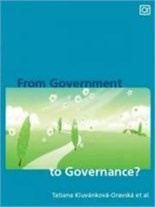Author
Tatiana Kluvánková-Oravská (editor)
Publication year
2010
Source
Prague: Alfa Nakladatelství
The book collects 5 chapters presenting conceptual contribution to the evolution of environmental governance in the enlarged EU and 8 case studies on the tools and processes for new governance of water and biodiversity in Europe. It aspires to provoke academic and policy debate on the evolution of environmental governance in the region of Central and Eastern Europe The book will be of interests to interdisciplinary researchers, policy makers and students.
It is written by a team of 17 authors from 10 European countries: Dr. Tatiana Kluvánková-Oravská, Professor Andy Gouldson, Professor Jouni Paavola, Professor Jiřina Jílková, Dr. Lenka Slavíková, Dr. Veronika Chobotová, Dr. Felix Rauschmayer, Dr. Dimitrios Zikos, Dr. Maria Falaleeva, Ms. Minna Santaoja, Dr. Norbert Kohlheb, Dr Bálint Balázs, Dr. Peter Wirth, Dr. Gérard Hutter, Dr. Jochen Schanze, Dr. Ilona Banaszak, Ms. Sonja Trifunovová.
About the author

Tatiana Kluvánková-Oravská
Founder and director of the Centre for Transdisciplinary Study of Institutions, Evolutions and Policies (CETIP) at the Institute of Forecasting at the Slovak Academy of Sciences in Bratislava. She is a member of the Management Committee of the COST Action IS0802 “Transformation of Global Environmental Governance: Risks and Opportunities (TGEG)".


